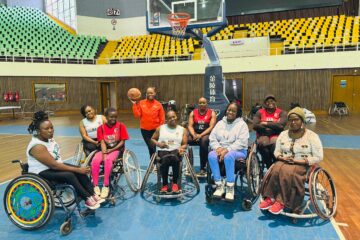Have you ever wondered if people with paraplegia can hold down a job, get married, live alone, or even thrive? Maybe you’ve just gotten the news that you may never walk again, or your relative, friend, or even spouse is going through this, and you are asking yourself these questions.
It’s okay to be curious – we are human, after all. I want to talk about these concerns that resound deeply with many of us in the paraplegic community. Can people with paraplegia lead independent lives? The answer, as you will see through the inspiring stories I share, is a resounding yes. Independence and self-sufficiency are not only possible but also achievable with determination, support, and the right mindset.
Independence is a concept that often gets misunderstood. It doesn’t necessarily mean doing everything by yourself without any help. For me, and many others living with paraplegia, independence means having control over our lives, making our own decisions, and living life on our terms. It means adapting to our circumstances and finding ways to thrive despite the challenges.
My story of independence: Can people with paraplegia lead independent lives?
Let me start by sharing my own story. When I first became paraplegic five years ago, the idea of independence seemed like a distant dream. I was overwhelmed by the changes and unsure of how I could lead a fulfilling life.
Would I ever live alone? Will life have meaning? Will I ever go back to work? And if I did, how would I navigate the intricacies of paraplegic life? Every day I would wake up to the same questions and with no one to assure me that I could be independent, I sunk into a feeling of helplessness and eventually built a cocoon around myself, in there, it was filled with self-pity, loathing, and despair.
Years went by and still, I couldn’t see any brightness in my life. But then, I came to a realization. I had to wake up, I had to find meaning in life. I owed it to myself to try, adapt, and find new ways to do things I once took for granted. And that was the beginning of something incredible.
How did you do it, Lucy? Do you live an independent life?
To answer your question yes, I am living an independent, happy life. Is it easy? Sometimes yes, other times no. Before I fully grasped the transformative power of my journey with paraplegia, I was devastated. As a hydrologist, my career involved long hours of fieldwork, walking, and navigating rough terrains. The physical demands of my job seemed impossible to meet, and I felt my career slipping away. But out of this profound loss came a chance to pursue a long-held passion: writing.
I immersed myself in learning new skills. Blogging, technical writing, creative writing ghostwriting—I embraced them all. I dove deep into understanding WordPress, SEO, and digital marketing. Every step was a challenge, but each article I wrote brought me closer to a new sense of purpose. It wasn’t easy; it required immense effort, countless falls, and the determination to stand up and try again.
Quotes by famous authors often echoed in my mind, guiding me through tough times. As Ernest Hemingway once said, “We are all broken—that’s how the light gets in.” This became my mantra. Eventually, my hard work paid off, and I landed a job as a remote content writer. Working from home, doing something I love, felt like a dream come true. The beauty of my transformation from scared and uncertain to confident and blossoming was a journey of self-discovery and resilience.
Learning these new skills and embracing my passion for writing was not just about finding a new career—it was about reclaiming my identity and independence. I discovered that true peace of mind comes from accepting who you are and working tirelessly towards your goals. I learned to find beauty in my struggles and strength in my scars.
As a writer, I now have the privilege to share stories of independence and self-sufficiency. Through perseverance and the support of my community, I have been able to establish myself as an advocate for others with disabilities, proving that financial independence and personal fulfillment are within reach.
Employment and financial independence: Can people with paraplegia lead independent lives?
Finding employment can be challenging, but it is not impossible. Many people with paraplegia have found meaningful work in various fields. I turned to blogging and writing as a way to share my experiences, connect with others, and earn a living.
Remote work opportunities have expanded significantly, providing more options for people with disabilities. Technology plays a crucial role in leveling the playing field, enabling us to work from home and contribute to society in meaningful ways. Through perseverance and the support of my network, I was able to establish myself as a writer and advocate, achieving financial independence.
Stories of Independence: Can people with paraplegia lead independent lives?
My story is just one of many. Here are a few inspiring stories from others in the paraplegic community who have achieved remarkable independence:
Chelsie Hill: Dancing through adversity

Chelsie Hill with her daughter.
If you have been in the paraplegic community long enough, you know Chelsie Hill. After a car accident in 2010 left her paralyzed from the waist down, Chelsie faced a world of challenges. But instead of letting her disability define her, she used it as a stepping stone to inspire and empower others. Chelsie’s love for dance, which began long before her accident, became her driving force. She founded “The Rollettes,” a groundbreaking wheelchair dance team that not only showcases incredible talent but also cultivates a sense of community and empowerment among women with disabilities. Through her dance team, Chelsie shows that physical limitations don’t have to hinder one’s passions or dreams.
Chelsie’s impact goes beyond her dance routines; she is a beacon of hope and motivation for many in the paraplegic community. Her story of resilience and determination resonates with those who face similar challenges, proving that life can still be vibrant and fulfilling despite a spinal cord injury. Chelsie uses her platform to promote inclusivity, challenge stereotypes, and encourage others to pursue their dreams relentlessly.
Georginah Wambui: The E-commerce extraordinaire

Georginah Wambui strategizing her next business move.
Georginah Wambui has been in a wheelchair for the past nine years and six months. Despite the challenges, she has proven herself to be a true jack of all trades, running a successful online business without a physical storefront. Georginah’s entrepreneurial spirit shines through her e-commerce venture, where she not only sells various products but also manages international shipments, reaching customers across the globe.
As a single mother, Georginah’s determination extends beyond her business. She is raising an incredible young boy single-handedly, balancing her roles as a mom and a businesswoman with grace and strength. Her business thrives through her savvy use of online platforms, demonstrating that physical limitations cannot hinder entrepreneurial success. Georginah’s story is a testament to resilience and ingenuity, showing that with the right mindset, one can overcome any obstacle.
Kennedy Kimeli: Champion for disability rights

Kennedy Kimeli on his way to work.
Kennedy Kimeli’s life took a dramatic turn 14 years ago when a tragic road accident resulted in spinal cord injuries, confining him to a wheelchair. However, his spirit remained unbroken. As a social worker by profession, Kennedy has dedicated his life to championing the rights of children and youth with disabilities. His roles as a peer counselor, mentor, and advocate reflect his unwavering commitment to making a difference.
Kennedy works with SHAK Kiambu and Bethany Relief and International Rehabilitation, where he mentors and counsels children and youth with spina bifida, spinal injuries, and hydrocephalus. His mission is to help these young individuals see beyond their disabilities and seize every opportunity that comes their way. Through his guidance, he imparts valuable knowledge on self-care and the prevention and management of pressure sores.
A devoted father of two, Kennedy’s acceptance of his condition and focus on life have made him a self-motivator and an inspiring figure to many. His ambition is to ensure that every person living with a disability is treated with dignity and respect, just like anyone else. By advancing his studies in counseling psychology, Kennedy aims to further his impact, helping people focus on the positive aspects of life despite the numerous challenges they face.
Catherine: Empowering through peer training

Catherine posing with her friends in India.
Catherine has been living with paraplegia for 17 years, and her journey is marked by a profound impact on the lives of fellow wheelchair users. As a peer-to-peer trainer for Motivation, Catherine dedicates her time to helping adults and children with disabilities understand how to live fully and independently. Her work involves visiting schools and providing guidance to disabled children, instilling in them the confidence to embrace their disabilities and lead fulfilling lives.
Catherine’s role extends beyond training; she is also a devoted mother to a sweet baby girl and a successful businesswoman. Her ability to balance these responsibilities showcases her incredible strength and determination. Through her work and personal life, Catherine exemplifies resilience and empowerment, proving that a disability does not define one’s potential.
Overcoming Obstacles: Can people with paraplegia lead independent lives?
Independence does not mean the absence of obstacles. There are daily challenges that require creativity and resilience. From accessibility issues to societal attitudes, we face numerous hurdles. However, each challenge is an opportunity to innovate and push boundaries.
It is also about knowing when to ask for help and having a strong support network. Family, friends, caregivers, and community organizations play an important role in our journey. Their support, encouragement, and understanding are invaluable.
Leading an independent life with paraplegia also requires mental and emotional resilience. It’s essential to maintain a positive outlook, set realistic goals, and celebrate small victories. There will be setbacks, but they are part of the journey.
Therapy and counseling can provide valuable support, helping us cope with the emotional aspects of paraplegia. Engaging in hobbies, pursuing passions, and staying connected with loved ones is crucial for mental well-being. Independence is as much about a strong mind as it is about physical abilities.
Embracing Independence: Can people with paraplegia lead independent lives?
In conclusion, yes, people with paraplegia can lead independent lives. Independence is a multi-faceted journey that involves learning new skills, finding meaningful work, overcoming obstacles, and building strong support networks. It’s about adapting to our circumstances, embracing our strengths, and living life on our terms.
The stories of Chelsie, Georginah, Kimeli, Catherine, and countless others demonstrate that independence is not only possible but also a testament to the human spirit’s resilience and ingenuity. We are capable of achieving great things, and our lives are rich with purpose and meaning.
Thank you for being part of this journey with me. Together, we can continue to share our stories, support each other, and celebrate the incredible strength and independence within our community.



2 Comments
Nawa Mbangweta · July 4, 2024 at 7:50 am
That’s what paras are able to do. Totally capable of doing anything and living independent lives. I’m so encouraged by everyone featured in this.
From Struggle to Strength: Nawa Mbangweta's Journey - Unbroken Steps · September 17, 2024 at 9:44 am
[…] To anyone who’s just received the news that they’ll never walk again, Nawa offers this advice: […]